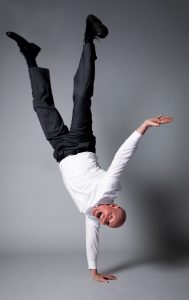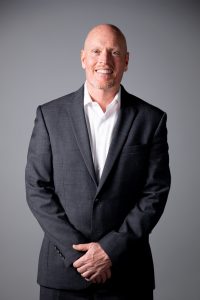A narrative by Brendan Price
For almost 25 years now, I’ve been in an unrelenting dance with cancer. It took my Mom. It claimed my wife. It came after me and pushed me to the brink. To get by, I needed a lot of support, from friends and family. To this day, I am amazed by the help I received. Believe me, I have seen lots of people sitting on waiting room couches all alone.
Of course, I wouldn’t be here today if it weren’t for great doctors and brilliant scientists working in places like Southern Research to discover treatments that give patients an increased chance for survival.
And I never lost hope. Hope, I discovered, is huge. It’s the golden side of a bad situation when you flip it over, like seeing the world while doing a handstand. I do a lot of those, about 10 a day. It gives me a different way of looking at things.

When cancer first arrived at my door, my life was rocking. I had returned to Texas, where I was coaching Elite level athletes alongside three-time Olympic Coach, Kevin Mazeika. Gymnastics was everything to me. I’d had a great gymnastics career at Southern Illinois University. I was even in the Guinness Book of World Records for the one-mile handstand relay.
Now I was back in Houston. I was young. I had spirit. I was healthy — seemingly.
But 1995 turned out to be a rough year. Early that year, my mom died of breast cancer. She waited too long to get a lump checked out. Her lesson to us was if you have a lump, go get it checked out. We were still in shock about my mother’s death when, bam, my diagnosis came, right out of nowhere. I was 31 years old.
THE DIAGNOSIS
It started with a swollen lymph node in my groin. It wouldn’t go away. When I went to the doctor, I was told it could be a number of things. Infected lymph gland. Cat scratch fever. So, I dismissed it at first. I didn’t feel sick. I wasn’t losing weight. I was working. Everything was good, but I had this lump.
Then the doctor called and said I should come in. It’s serious, she said. I ended up having a conversation sitting across from my doctor that no one ever wants to have. The diagnosis was Stage IV non-Hodgkin large cell B lymphoma. It was considered incurable. That scares a lot of people. And it scared me.
The treatment started immediately. I was given a cocktail of drugs. One of them was fludarabine, which was discovered at Southern Research, though I didn’t know that at the time. Chemo was difficult, no doubt about it. What fludarabine and that cocktail did for me, though, was to get me into remission.
Fludarabine helped me. It has helped a lot of people.
I was super happy about being in remission. My oncologist told me it wouldn’t last, that the cancer would come back. But I got five years of health, five years of a cancer-free life. It allowed me to meet my future wife, Jana, and marry her. I am forever grateful for that.
One day, a friend called about a job possibility in a new production at Disney World called “Festival of the Lion King.” They needed acrobats, so I started to get back into shape. I tried to do chin-ups. I probably ran all of 20 yards that first day. I got stronger and went to Orlando and auditioned with a bunch of young, healthy, ripped guys with full heads of hair. Despite feeling too old and too sick, Disney offered me the job.
Five years and one week after remission came the relapse.
It was my annual checkup in 2002. I felt tired, but I had been working really hard at Disney. It was a surprise, even though that’s the dynamic of the disease. The treatment started, and it was looking grim. An operation removed one third of my liver. The chemo wasn’t working. It was not looking good. I had a bone marrow transplant, and the recovery was slow. I was super sick.
Then, one day, I got a call from Jana. A checkup showed breast cancer. My mom, then me, now her. It was unbelievable. She went from being an amazing caregiver to a patient. We were both sick at the same time. One day, I might be her primary caregiver, the next day she might be mine. It was flip-flopping.
I got better. I’ve been in remission since 2003. When Jana died, she was 53, same age as my mother.
CRITICAL RESEARCH

After that, I moved to Asheville, North Carolina, a place we had loved. Later, I got a call from friends in Birmingham, and I have been here for three and a half years. Last fall, a friend invited me to her house to learn about Southern Research’s fundraiser, The Change Campaign. I was glad I went.
I heard about the seven cancer drugs that have been discovered at Southern Research. I knew all about fludarabine. I was lucky to speak to Dr. Rebecca Boohaker about my experience and how fludarabine had helped me. I even spent a morning with her and got a back-stage tour of what is going on at Southern Research.
I’m encouraged by the work taking place under one roof at Southern Research. There’s not only cancer research, but also neuroscience, green chemistry, and more. The possibilities are unlimited. I’m not sure a lot of people in Birmingham really know what they have here in Southern Research.
To some extent, cancer treatment has been and continues to be slash and burn. It’s about killing cancer cells, but there is collateral damage. The future of treatment is immunotherapy, and that is one of the things that is going on at Southern Research. I think people should get behind that, and donating to their cancer research program is one way to do that.
Today, the description of my status is cancer-free. My oncologists at UAB and I have talked about a “cure.” I don’t use that word for myself. It’s not that I am being negative. It’s that today, in this moment, I am alive, and I am healthy. Tomorrow, I might or might not be.
Through all this, I’ve learned that there can be a golden side to every bad situation when you flip it over. I’m reminded of that every time I do a handstand – inverted, looking at things with an entirely new perspective.
Read a story about how fludarabine helped young Liliana Thompson.